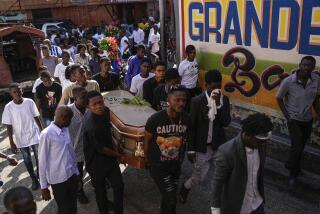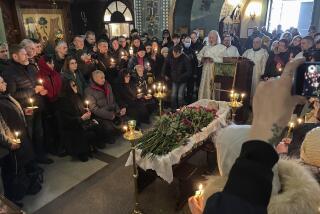Chile reveres, reviles Pinochet
SANTIAGO, CHILE — They came not to bury the ex-despot but to praise him.
“El general saved us from communism,” said Maria Elena Tiznado, one of thousands of Chileans who stood in line for hours beneath the blazing sun Monday to pay final respects to Augusto Pinochet. “We would be another Cuba now if it weren’t for el general.”
Many in this Andean nation voiced hope that the death of the 91-year-old Pinochet on Sunday would finally cast off the polemical shroud that still envelops his 17-year rule, which ended in 1990 when he was pushed aside and democracy was restored.
But in the short term, at least, the opposite has happened: Pinochet appears as divisive a figure in death as he was in life.
“In the last hours we have seen gestures of division that we don’t like,” acknowledged President Michelle Bachelet, who survived one of Pinochet’s most notorious torture centers in her youth and joined hundreds of thousands of Chileans in exile. “But I know that we, as a country and as a society, have the ethical strength to move forward.”
Viewed as an almost archetypal despot by much of the world, Pinochet, who died a week after suffering a heart attack, continues to have a mixed legacy among his compatriots.
On Sunday, as word of his demise spread, police fought to keep order among anti-Pinochet celebrators who tossed bottles and set up bonfire barricades not far from the presidential palace downtown that was famously bombed by jet fighters during the Pinochet-led coup on Sept. 11, 1973, that toppled President Salvador Allende. Thousands took to the streets, most celebrating peacefully, but their actions enraged the general’s die-hard backers.
On Monday, it was the turn of the pro-Pinochet activists, who came out en masse to view the general’s open casket in the main hall of a military school in the upscale Las Condes district.
“I’m not sure my mother would have been able to care for me if it had not been for Pinochet taking over,” said Carolina Donoso, 29, born four years after the coup but knowledgeable about the economic chaos that preceded Pinochet’s putsch. “The country was headed for ruin.”
The dictator’s adherents have remained largely in the background in recent years as an economically robust Chile, having returned to its democratic roots, elected four center-left governments, including current President Bachelet. Within hours of Pinochet’s death, she ruled out a state funeral, infuriating the ex-dictator’s family and their allies.
“I feel that it would violate the conscience of many Chileans to honor a person who has been implicated in matters of human rights and the [mis]use of public funds,” Bachelet had said during her campaign last year.
The legions of mourners presented themselves as a kind of silent majority insistent on expressing public gratitude to their hero.
As they waited to view Pinochet’s body, supporters hoisted flags and banners saluting the old strongman, sang the national anthem and burst into boisterous, stadium-style chants of “Pin-o-chet! Pin-o-chet!”
Once inside the hall, some wept as they viewed the familiar countenance of Pinochet, clearly visible in his glass-topped coffin. He wore a blue “gala” uniform, and a sword, braided cap and jacket rested on the foot of the coffin, along with rosary beads and a likeness of the Virgin Mary.
Some kissed the glass; others just touched it. Many prayed.
“My entire family wishes him all the peace and tranquillity in the world,” said Maria Consuelo Nieto, 60. “I recall what this country went through. People are very ungrateful.”
Reports here indicated that the military had been preparing for weeks, if not months, for the public wake and funeral, which is to be held today. Pinochet had an acute understanding of the potency of funereal spectacles, having ordered that Allende’s remains be interred secretly in a provincial cemetery after the coup.
“Put him in a box and send it in a plane,” Pinochet declared on the day of the coup after learning that Allende had died, apparently by suicide, in the presidential palace, according to transcripts of radio transmissions made public years later. “Do the burial somewhere else, in Cuba. If not, there is going to be a mess with the burial.”
Once democracy was restored here, Allende’s remains were removed from the countryside and interred in the General Cemetery in the capital. That sprawling cemetery is also the site of a “dirty war” memorial, a granite wall inscribed with the names of most of the estimated 3,200 people who were killed by the Pinochet regime.
“It sickens me to think of these people celebrating the memory of Pinochet, the murderer,” said Maria Carcamo, 53, who hugged a likeness of Allende as she and others gathered Monday in a quiet counterpoint to the boisterous scene of the general’s wake.
Vibiana Diaz Caro held a grainy black-and-white photograph of her father, a union leader who disappeared after being abducted during Pinochet’s rule. He was 56 at the time, she recalled, exactly her age now.
“At least Pinochet was able to die a natural death, surrounded by his family, attended to by the best surgeons,” she said. “We weren’t even able to bring a drink of water to our loved ones as they were tortured and disappeared. But we know the truth: History has cast its judgment on Pinochet.”
*
Times special correspondents Eva Vergara and Claudia Lagos Lira contributed to this report.
More to Read
Sign up for Essential California
The most important California stories and recommendations in your inbox every morning.
You may occasionally receive promotional content from the Los Angeles Times.










